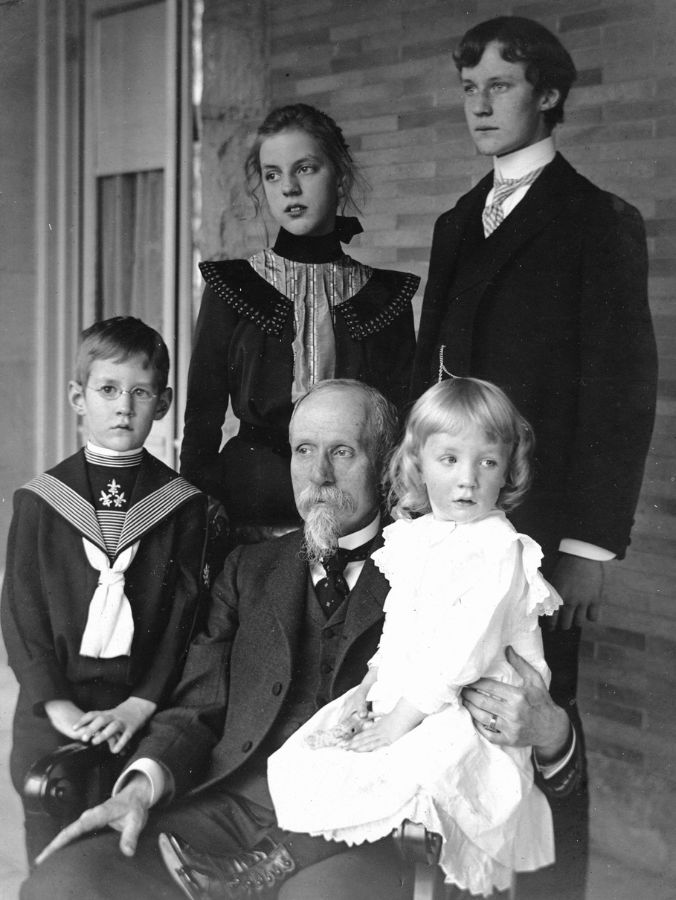-
Who We Are
Who We Are
For the last century, we’ve dedicated ourselves to empowering families like yours to prosper and endure. Like many of the leading families we serve, we have been through our own wealth journey.
Discover Pitcairn -
What We Do
Wealth Momentum®
The families we serve and the relationships we have with them are at the center of everything we do. Our proprietary Wealth Momentum® model harnesses powerful drivers of financial and family dynamics, maximizing the impact that sustains and grows wealth for generations to come.
Explore - Insights & News

The first time I attended a family meeting for a prominent American family was a big eye-opener. I was maybe 30 years old and attended in my capacity as a junior investment advisor. The setting was a fancy private club in Chicago. The room was beautiful, and the club’s service was excellent.
One problem: it was an incredibly stuffy affair (suits, ties, dresses, etc.) with a table set up like a corporate board meeting, even though there were only eight family members in attendance. The family matriarch in her early 80s sat at the head of the table, and other family members were invited to speak when they were spoken to. There was no particular agenda other than to have an endless stream of advisors (including me) go through thick slide decks of numbers, charts, and graphs. Not exactly the warm, free-flowing exchange one might want for such a meeting. The result was a boring one-way street of information with no new ideas and no time for relationship building. After the meeting was over, a painful five hours later (my endless charts and graphs probably didn’t help), we all filed down to the dining room at the club for dinner. As I recall, pretty much everyone ordered a stiff drink.
Successful family meetings are an essential component of managing a family-owned business, especially for wealthy families. Such gatherings are not only about ensuring the smooth operation of the business — as was somewhat achieved in the example above — but also about facilitating family harmony and ensuring that relationships and the family’s legacy continue through generations. So, after more than twenty years of attending various meetings across dozens of families, here are 11 tips for facilitating productive family meetings that foster unity and effectively grow wealth across generations.
Communicate a Clear Purpose and Agenda
Before every meeting, clearly define its purpose. What are we going to talk about? Is the focus on succession planning, discussing business performance, or resolving a specific issue? An agenda sets the tone and direction, ensuring discussions remain focused and productive. Circulate the agenda ahead of time, allowing family members to prepare, contribute items for discussion, and set their expectations appropriately.
Choose a Setting that Engages
Most family meetings are successful when people are relaxed in a neutral setting. Think about a resort that has a mix of spaces and different activities for people to interact with one another and enjoy spending together. Such a setting will be more comfortable and engaging for everyone, especially if there are some fun activities built into the schedule.
Give Everyone a Role
People are more engaged when they have a role in a meeting. This is especially true for rising gen family members who may not know much but can build good habits of engagement early on. Such involvement can both educate family members about the business, including its history and values and help everyone prepare for future responsibilities. This involvement also acts as a training ground for future roles they may hold in the business. Educating them about budgeting, credit, investing, and the complexities of wealth management is crucial for the sustainability of family wealth.
Balance Business and Personal
While the primary focus of family meetings might be the business, it’s essential not to overlook the personal relationships within the family. Allocate time to discuss and celebrate individual achievements, milestones, or even concerns that may indirectly impact the business. This not only strengthens family bonds but also builds a supportive environment conducive to business success.
Facilitate Open and Honest Communication
A key ingredient to successful family meetings is the ability to have open and honest conversations. Encourage a culture where everyone feels safe to express their thoughts and concerns without fear of judgment or repercussion. This might require setting ground rules for communication, such as listening without interruption and respecting differing opinions.
Review Governance Structures
Wealthy families with business interests often benefit from formal governance structures. This can include a family council or a board of directors comprising both family and non-family members. These structures help in making objective decisions and provide a professional approach to managing family business affairs. They also can serve to mediate disputes and ensure that all voices are heard and valued.
Hire Professional Facilitation
Sometimes, having an external facilitator can help manage the dynamics of family meetings, especially if there are complex issues to resolve or a history of conflict. A facilitator can ensure that the meeting progresses smoothly, everyone gets a chance to speak, and discussions remain constructive. They can also help clarify misunderstandings and provide impartial perspectives on business matters.
Be Consistent with Scheduling and Follow-Ups
Consistency is key. Schedule family meetings at regular intervals — be it quarterly or annually — so everyone knows when they will occur and can plan accordingly. Additionally, follow up on action items and decisions made during the meetings. This accountability ensures that meetings lead to concrete outcomes and progress in business and family objectives.
Plan for Conflict Resolution
Disagreements are inevitable in any family business. Planning how to handle conflicts before they arise can save a lot of trouble. Establishing a conflict resolution protocol as part of the family governance structure can help manage disputes effectively and prevent them from escalating.
Document Decisions
Maintaining records of what is discussed and decided in meetings is crucial. This documentation helps track progress, holds members accountable, and serves as a reference for future discussions. It also aids in legal and financial planning, ensuring all decisions align with the family’s business strategies and estate plans.
Celebrate Success
Lastly, make it a point to celebrate successes together as a family. Whether it’s reaching a business goal, a successful investment, or a well-managed family project, celebration reinforces positive dynamics and encourages a culture of appreciation and achievement.
Family meetings are more than just business discussions; they are pivotal in nurturing the family’s unity, aligning its members towards common goals, and securing a legacy. By following these strategies, wealthy families can maximize the productivity of their family meetings, ensuring both their business and family bonds flourish.
Disclaimer: Pitcairn Wealth Advisors LLC (“PWA”) is a registered investment adviser with its principal place of business in the Commonwealth of Pennsylvania. Registration does not imply a certain level of skill or training. Additional information about PWA, including our registration status, fees, and services is available on the SEC’s website at www.adviserinfo.sec.gov. This material was prepared solely for informational, illustrative, and convenience purposes only and all users should be guided accordingly. All information, opinions, and estimates contained herein are given as of the date hereof and are subject to change without notice. PWA and its affiliates (jointly referred to as “Pitcairn”) do not make any representations as to the accuracy, timeliness, suitability, completeness, or relevance of any information prepared by any unaffiliated third party, whether referenced or incorporated herein, and takes no responsibility thereof. As Pitcairn does not provide legal services, all users are advised to seek the advice of independent legal and tax counsel prior to relying upon or acting upon any information contained herein. The performance numbers displayed to the user may have been adversely or favorably impacted by events and economic conditions that will not prevail in the future. Past investment performance is not indicative of future results. The indices discussed are unmanaged and do not incur management fees, transaction costs, or other expenses associated with investable products. It is not possible to invest directly in an index. Projections are based on models that assume normally distributed outcomes which may not reflect actual experience. Consistent with its obligation to obtain “best execution,” Pitcairn, in exercising its investment discretion over advisory or fiduciary assets in client accounts, may allocate orders for the purchase, sale, or exchange of securities for the account to such brokers and dealers for execution on such markets, at such prices, and at such commission rates as, in the good faith judgment of Pitcairn, will be in the best interest of the account, taking into consideration in the selection of such broker and dealer, not only the available prices and rates of brokerage commissions, but also other relevant factors (such as, without limitation, execution capabilities, products, research or services provided by such brokers or dealers which are expected to provide lawful and appropriate assistance to Pitcairn in the performance of its investment decision making responsibilities). This material should not be regarded as a complete analysis of the subjects discussed. This material is provided for information purposes only and is not an offer to sell or the solicitation of an offer to purchase an interest or any other security or financial instrument.






